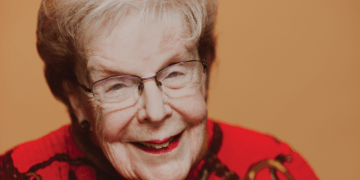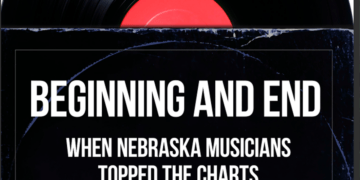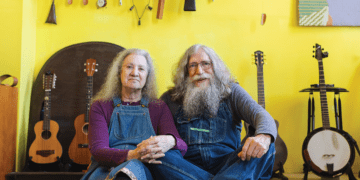Life was good for Michael and Judy James as they entered their 60s. They had been happy together for almost 40 years. The native New Englanders were enjoying successful careers after relocating in 2000 to the Midwest to teach at the University of Nebraska-Lincoln: Judy as a textile artist and visiting lecturer; Michael in the faculty of the Department of Textiles. The couple had been thrilled to see their son, Trevor, become a father to twin girls in 2007.
In 2009, Judy was diagnosed with Alzheimer’s disease, a degenerative neurological condition that affects thinking, behavior, and memory loss. In a sad juxtaposition over the next six years, the couple watched their granddaughters blossom as Judy declined.
“As they were learning to write, first learning to read, learning the alphabet, learning numbers, she was losing all that,” Michael said. “So, as they were going up one side of the slope, she was going down the other side. In the progression of the disease, all those cognitive and intellectual skills disappear.”
At 61, Judy was younger than most at the time of diagnosis. Neither Michael nor Judy had a family history of dementia or any experience with caregiving for someone with cognitive impairment.
“It was like throwing us into completely unknown territory,” Michael recalled. He sought answers in books from medical texts to personal accounts. “To me, some of them were really helpful. I’m a realistic and pragmatic person; I see a problem, I want to know everything I can about it. I don’t want to put unpleasant things aside and not think about them, because that isn’t a solution in any way, shape, or form. I think it’s better to confront the challenge and then build toward adapting to it, responding to it in a thoughtful and prepared way.”
Michael had published two books in the late 1970s and early 1980s, both focused on the art of quilt-making, a professional and creative specialty; he’s recognized as a leader in the “artquilt” movement that began in the 1970s, and his works are included in many American art museums. In 2013, he began a two-year studio project exploring ambiguous grief and loss that culminated in a show featuring 14 of his pieces. He also reflected upon the experience of his wife’s illness through the medium of writing, both in poetry and a blog. After Judy’s death in 2015, Michael wrote “Dear Judy: A Love Story Rewritten by Alzheimer’s,” published in 2023 by Pine Eden Press. Judy’s art is featured on the cover.
In the form of letters with narrative transitional copy, Michael recounted his and Judy’s experience with Alzheimer’s as the disease advanced. He addressed their struggles to accommodate each stage of Judy’s decline and her lost memories and skills. Michael also openly acknowledged grieving in the midst of trying to maintain the best life possible for both Judy and himself. He even shared his reflections on facing adversity and the rewards of caregiving.
“One of the biggest things I learned was how to be in the moment with her. She reached the point where she was fully in the moment, all the time; there was no past for her, there was no future. I felt things were most harmonious when I could be as much in the moment as she was,” he said. “That helped me get past my impatience, and it taught me that patience really is a lot about being in the moment and accepting the moment.”
In his book, Michael provides practical advice for caregivers and offers perspective gained from his experience.
“This is the exact type of book I didn’t have at my fingertips early on, back then,” Michael said. “There are some other good memoirs, though. In the back of my book, I list a number of them—that I read later in Judy’s disease or even after her death—that I think would have been really useful to me early on.”
Michael began seeing a therapist about four years into Judy’s diagnosis, a point when her needs were increasing, but she was resisting the idea of adult day services.
“I didn’t feel I had the option of retiring early to devote myself entirely to her care, because then we wouldn’t have had health insurance,” he said. “I felt I really needed to talk to somebody to help me negotiate the anxiety, because I was experiencing a lot of anxiety and a lot of fear. The therapist that I saw had a lot of experience with dementia and dementia caregivers, and he helped me a lot.”
Alzheimer’s has its ups and downs, Michael said, and can be confusing for caregivers who know the disease will inevitably progress despite some days being better than others.
“There are moments of clarity, and they’re brief but shining moments, and in hindsight, I sometimes wish that I had appreciated those moments more,” he said. “I would be puzzled by them, and I’d have that hopeful feeling: ‘Maybe this is going to get better.’ That’s not how it works.”
Dementia can present flashes of levity, too, Michael said, like the time Judy said, “I’m knowing my blows” instead of “blowing my nose.”
“There were some moments where you could chuckle. There’s a term for that point in the progression of the disease when a sufferer no longer knows that they have this disease, it’s called ‘anosognosia.’ Once Judy reached that point, there were some funny episodes,” he recalled. “One time I said something to her, and she goes, ‘Why not?’ And I said, ‘Well, because you have Alzheimer’s.’ And she goes, ‘I do?’ I said, ‘This disease has been progressing for several years.’ And she goes, ‘Oh, well, I’ll have to remember that.’”
Hiring home health care extended the time Judy could be cared for at home, a resource Michael said he realizes is not attainable for most people.
“It helped her develop some new relationships that she really valued and her caregivers equally valued. We were very lucky in that regard. Eventually, when I finally had to put her in full-time memory care, she adapted to that very quickly and never objected, never once asked to go home. That was a blessing,” he said. “I did a really good job, in hindsight, but I felt guilty a lot of the time. I would say now there’re a few things I regret that I didn’t do, that I would do differently if I had to do it over again, but (now) I don’t feel guilty. You do the best you can, and I feel like I did everything I could, under the circumstances.”
Michael became part of a local group of caregiver husbands, six of them now widowers, who still meet regularly. Duane Westing is currently the only man among the group who is an active caregiver.
“Linda, my wife, was diagnosed with early-onset Alzheimer’s three years ago,” Westing said. “It is a most difficult thing to go through, and it is so important for caregivers to learn from each other, whether through reading or support groups. Linda and I are in two groups, and I attend the one for men that Michael invited me to.”
Talking to other caregiver husbands has provided comfort and assurance for Westing.
“As a pastor and chaplain, I have been into caregiving more than most (men)—but I still get frustrated, impatient, and disappointed,” he admitted.
He’s also finding support in reading “Dear Judy.”
“I am so glad he wrote the book and was so open and honest about his experiences,” Westing said. “Michael’s book has been most helpful to us on an ongoing basis. I read a chapter and then discuss it with Linda. We go slowly, because it is both difficult and comforting to read their story—comforting because we can identify with a lot of their experiences, difficult because we hurt for them and are sad about what may happen to us.”
Michael is remarried now, and his wife, Linda, who has also lived through the experience of losing a spouse, has been very supportive of the “Dear Judy” project. James not only pays tribute to his former wife in his memoir, but still speaks of Judy with great fondness.
“I think about her, often, multiple times a day, sometimes dream about her,” he said. “She was very thoughtful and very considerate of other people and very compassionate—just a lovely person.”
“Dear Judy: A Love Story Rewritten by Alzheimer’s” by Michael F. James is available from most booksellers. For more information, visit
pineedenpress.com.
This article originally appeared in the March/April 2024 issue of Omaha Magazine. To subscribe, click here.
Life was good for Michael and Judy James as they entered their 60s. They had been happy together for almost 40 years. The native New Englanders were enjoying successful careers after relocating in 2000 to the Midwest to teach at the University of Nebraska-Lincoln: Judy as a textile artist and visiting lecturer; Michael in the faculty of the Department of Textiles. The couple had been thrilled to see their son, Trevor, become a father to twin girls in 2007.
In 2009, Judy was diagnosed with Alzheimer’s disease, a degenerative neurological condition that affects thinking, behavior, and memory loss. In a sad juxtaposition over the next six years, the couple watched their granddaughters blossom as Judy declined.
“As they were learning to write, first learning to read, learning the alphabet, learning numbers, she was losing all that,” Michael said. “So, as they were going up one side of the slope, she was going down the other side. In the progression of the disease, all those cognitive and intellectual skills disappear.”
At 61, Judy was younger than most at the time of diagnosis. Neither Michael nor Judy had a family history of dementia or any experience with caregiving for someone with cognitive impairment.
“It was like throwing us into completely unknown territory,” Michael recalled. He sought answers in books from medical texts to personal accounts. “To me, some of them were really helpful. I’m a realistic and pragmatic person; I see a problem, I want to know everything I can about it. I don’t want to put unpleasant things aside and not think about them, because that isn’t a solution in any way, shape, or form. I think it’s better to confront the challenge and then build toward adapting to it, responding to it in a thoughtful and prepared way.”
Michael had published two books in the late 1970s and early 1980s, both focused on the art of quilt-making, a professional and creative specialty; he’s recognized as a leader in the “artquilt” movement that began in the 1970s, and his works are included in many American art museums. In 2013, he began a two-year studio project exploring ambiguous grief and loss that culminated in a show featuring 14 of his pieces. He also reflected upon the experience of his wife’s illness through the medium of writing, both in poetry and a blog. After Judy’s death in 2015, Michael wrote “Dear Judy: A Love Story Rewritten by Alzheimer’s,” published in 2023 by Pine Eden Press. Judy’s art is featured on the cover.
In the form of letters with narrative transitional copy, Michael recounted his and Judy’s experience with Alzheimer’s as the disease advanced. He addressed their struggles to accommodate each stage of Judy’s decline and her lost memories and skills. Michael also openly acknowledged grieving in the midst of trying to maintain the best life possible for both Judy and himself. He even shared his reflections on facing adversity and the rewards of caregiving.
“One of the biggest things I learned was how to be in the moment with her. She reached the point where she was fully in the moment, all the time; there was no past for her, there was no future. I felt things were most harmonious when I could be as much in the moment as she was,” he said. “That helped me get past my impatience, and it taught me that patience really is a lot about being in the moment and accepting the moment.”
In his book, Michael provides practical advice for caregivers and offers perspective gained from his experience.
“This is the exact type of book I didn’t have at my fingertips early on, back then,” Michael said. “There are some other good memoirs, though. In the back of my book, I list a number of them—that I read later in Judy’s disease or even after her death—that I think would have been really useful to me early on.”
Michael began seeing a therapist about four years into Judy’s diagnosis, a point when her needs were increasing, but she was resisting the idea of adult day services.
“I didn’t feel I had the option of retiring early to devote myself entirely to her care, because then we wouldn’t have had health insurance,” he said. “I felt I really needed to talk to somebody to help me negotiate the anxiety, because I was experiencing a lot of anxiety and a lot of fear. The therapist that I saw had a lot of experience with dementia and dementia caregivers, and he helped me a lot.”
Alzheimer’s has its ups and downs, Michael said, and can be confusing for caregivers who know the disease will inevitably progress despite some days being better than others.
“There are moments of clarity, and they’re brief but shining moments, and in hindsight, I sometimes wish that I had appreciated those moments more,” he said. “I would be puzzled by them, and I’d have that hopeful feeling: ‘Maybe this is going to get better.’ That’s not how it works.”
Dementia can present flashes of levity, too, Michael said, like the time Judy said, “I’m knowing my blows” instead of “blowing my nose.”
“There were some moments where you could chuckle. There’s a term for that point in the progression of the disease when a sufferer no longer knows that they have this disease, it’s called ‘anosognosia.’ Once Judy reached that point, there were some funny episodes,” he recalled. “One time I said something to her, and she goes, ‘Why not?’ And I said, ‘Well, because you have Alzheimer’s.’ And she goes, ‘I do?’ I said, ‘This disease has been progressing for several years.’ And she goes, ‘Oh, well, I’ll have to remember that.’”
Hiring home health care extended the time Judy could be cared for at home, a resource Michael said he realizes is not attainable for most people.
“It helped her develop some new relationships that she really valued and her caregivers equally valued. We were very lucky in that regard. Eventually, when I finally had to put her in full-time memory care, she adapted to that very quickly and never objected, never once asked to go home. That was a blessing,” he said. “I did a really good job, in hindsight, but I felt guilty a lot of the time. I would say now there’re a few things I regret that I didn’t do, that I would do differently if I had to do it over again, but (now) I don’t feel guilty. You do the best you can, and I feel like I did everything I could, under the circumstances.”
Michael became part of a local group of caregiver husbands, six of them now widowers, who still meet regularly. Duane Westing is currently the only man among the group who is an active caregiver.
“Linda, my wife, was diagnosed with early-onset Alzheimer’s three years ago,” Westing said. “It is a most difficult thing to go through, and it is so important for caregivers to learn from each other, whether through reading or support groups. Linda and I are in two groups, and I attend the one for men that Michael invited me to.”
Talking to other caregiver husbands has provided comfort and assurance for Westing.
“As a pastor and chaplain, I have been into caregiving more than most (men)—but I still get frustrated, impatient, and disappointed,” he admitted.
He’s also finding support in reading “Dear Judy.”
“I am so glad he wrote the book and was so open and honest about his experiences,” Westing said. “Michael’s book has been most helpful to us on an ongoing basis. I read a chapter and then discuss it with Linda. We go slowly, because it is both difficult and comforting to read their story—comforting because we can identify with a lot of their experiences, difficult because we hurt for them and are sad about what may happen to us.”
Michael is remarried now, and his wife, Linda, who has also lived through the experience of losing a spouse, has been very supportive of the “Dear Judy” project. James not only pays tribute to his former wife in his memoir, but still speaks of Judy with great fondness.
“I think about her, often, multiple times a day, sometimes dream about her,” he said. “She was very thoughtful and very considerate of other people and very compassionate—just a lovely person.”
“Dear Judy: A Love Story Rewritten by Alzheimer’s” by Michael F. James is available from most booksellers. For more information, visit
pineedenpress.com.
This article originally appeared in the March/April 2024 issue of Omaha Magazine. To subscribe, click here.













